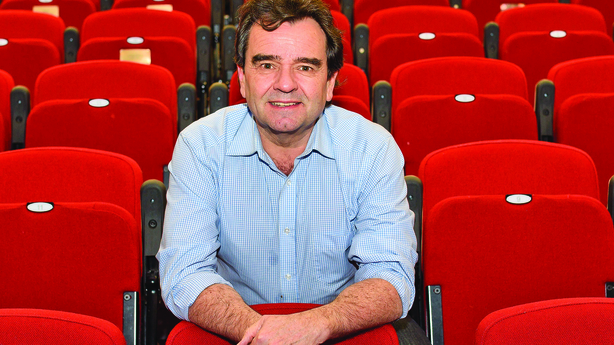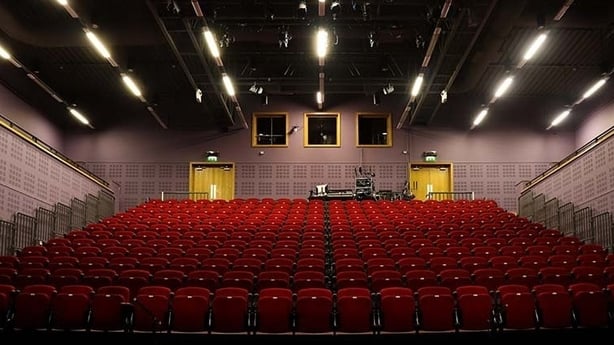Donal Shiels is the CEO and Artistic Director of The Civic Theatre, a lively cultural beacon in the heart of Tallaght in Dublin, currently celebrating their 25th year in operation.
The Civic plays host to theatre, live music, comedy and performance, alongside artistic endeavour of every imaginable shape and size, including a busy studio space and community outreach programmes.
Below, Donal tals to RTÉ Culture about the challenges that face venues in Ireland, the importance of putting audiences first and making the move from independent producer to running a busy theatre space...
A lot of focus goes on the big houses, the big institutions, the cornerstones of Irish cultural life. I feel like there is a second tier that's crucial to the lifeblood of Irish arts activity...
Absolutely. You could equate it to business in a sense, where often the headlines are about the multinationals and yet they are important, but they're not the be all and end all. The small to medium-sized enterprises are what actually keeps the blood flowing in the veins throughout the whole country and keeps the country moving in the right direction. And there's been such a huge shift in the last few years for micro industries that have become very, very successful.
📣 DUBLIN FRINGE IS BACK 📣
— The Civic (@civictheatre) July 17, 2024
We're thrilled to be a part of the #DublinFringeFestival this year as they celebrate their 30th anniversary of bringing the EXTRAORDINARY to Dublin
'The Man Who Talks to Statues' by Shane Casey will run 5-11 Sept #WorldPremierehttps://t.co/T8RYTSDExl pic.twitter.com/fE12svESro
I think the arts is very reflective of that too, where there was maybe a template for years in the way that the arts and theatre in particular worked. And now I think there's recognition that that one size fits all doesn't fit everyone's brains, eyes and desires. And no better place than here in Tallaght to really adopt that model, because there's so many different eclectic tastes, so many different cultures and so many different needs. From the needs of the stakeholders who are the council, the needs of the audience, the needs of the stage schools who are very important, doing a great job for the community as well, and the needs of ultimately the artists as well to be able to feel that they can come in somewhere and not have to worry about anything and just do the thing that they love doing, which is the creation of work and the creation of art.

And then for you as a programmer, how pragmatic do you have to be when it comes to your audience? Because in the end you have an artistic criteria that you want to fulfill, but also you also have to fill seats. How do you approach that?
There's a few ways. We're very lucky here in The Civic in that we have our smaller studio space and that allows me to maybe take some small calculated risks as well. It also allows me to program work to run for more than just one night - most of the theatre work we do in the studio will run for a week. And we have also introduced a strand of lunchtime showings as well, which all have proved very popular. And I think that shows you that audiences have changed. Certainly now, people are very happy to see shows at lunchtime.
So having two spaces is really helpful. And then also our partnerships are very important, with artists, companies and festivals. We've partnerships with the Dublin Theatre Festival and this year we started a new partnership with Dublin Fringe. We have the Red Line Book Festival as well. And that all happens from September through October. But we have been also able to produce shows ourselves, and that's been very beneficial. Some of it was necessity, but some of it was actually born out of the want, the need, the desire to do that.
One of the comments that comes back - we take research from every single show that we do, and one of the words that comes up is friendly. It's a very friendly venue, and there's a duty of care there for our audience and our artists that's very prevalent. It makes certainly my job an awful lot easier to know that I have people working here who absolutely love working here and being here. And I think the audience sense that as well. So it makes all our jobs easier
I get a sense that people post-Covid want dialogue. Audiences want to be in dialogue with people. They don't want to be on their own.
I know the show is still the thing, but you always have to work to get audiences in the door...
Yeah, you just need to be smarter and maybe a bit more sensitive about how you engage and talk to your audience, be that via marketing or be it actually standing in the venue and literally talking to them, it's as effective as anything, and how you communicate what you're doing to the audience that you want to come see your shows. So our audience will come 50% of them from the immediate area. And then we'd also have a quota of people coming from Wicklow, Kildare, Meath, and from Dublin City Centre as well. We've got free parking, you've got a Luas on the doorstep, public transport on the doorstep, really good value for food, value for ticket price as well. So you can get in and out of here with your dinner and a show for 45 euro. That's not bad going.

What's surprised you in the year and a half you've been at The Civic? Give me an example of a show that felt like a punt, that people then embraced...
The first show we did in the studio theatre just clicked straight away. It just worked. And then I knew people liked the intimacy of the theatre, the studio in particular. They liked the feeling of being close to the performer. They really enjoy that. And then some of the post-show conversations, we have to just stop them at a certain point if they're going on so long. They like the dialogue, they really enjoy that and that's encouraging.
I get a sense that people post-Covid want dialogue. Audiences want to be in dialogue with people. They don't want to be on their own. They don't want to necessarily only sit and look at Netflix. Anyone can do that. That can happen anytime, in the middle of the night, whatever. But actually it's like a new church when you come to say theatre where you can come with a group of people or come on your own and you're still going to be part of a congregation that will make your own creed or doctrine or whatever. And the glue is the art and the artist. That's what really just binds it all together.
Tonight! 🤩
— The Civic (@civictheatre) July 13, 2024
Last chance to catch
'7 Deadly Sins'
The world’s first hybrid eGaming and storytelling stage show.
Book Now 🎟 https://t.co/eqLdqmQ8D4
Utilising ground-breaking mapping technology, created in partnership with @MaynoothUni pic.twitter.com/YMJHhd83YZ
How much of your job is about general ambience, and getting the tone of the place right?
You're constantly adding to it, looking for ways to improve and add that extra 1%, 2% to what's going on. And I think that's really important. I don't see it as difficult. I just think it's like anything you do, you just want to make the experience better for people. And to be fair, the local council have been very good. They've redeveloped the area here. We're also in the middle of a rebranding exercise for the what is known as the cultural quarter. We've got the Civic, The Rua Red arts centre and the library, all within spitting distance of each other. And so that's going to happen at the end of this year. There'll be a new name for the area and there'll be a lot of work done on signage, which is very important because you get off the Luas and you don't necessarily know that within 20 metres there's a library, within 50 metres there's a gallery, and within a hundred metres there's a live performance space. So that needs to be done. And to be fair, they're listening and it will be done, we all want it to happen and it will happen.
As an independent producer turned venue manager, what's been the most enjoyable aspect of the job?
I think giving the opportunity for audience and artists to find each other. I think for me, that's an absolute privilege to be able to broker that arrangement, and the vast majority of the time it works. And once somebody is really trying to deliver on their talent, an audience only ever wants it. They want people to be successful, They want you to be brilliant. And that's been great to be able to offer people the opportunity to take that chance on both sides.
There can be long hours, but I love what I do. It'd be doing a different job if I didn't. So I don't think of it as hours, I think of it as possibilities and results for people that can help them with their career. And if people start here and go on to be brilliant, that's fantastic. Or if they're great somewhere else and we get them in, that's brilliant too. And what could be so awful about a job where, at the end of your working day - well maybe not the end - walking in to see a live show where people are having a great time?
Find out more about upcoming shows at the Civic Theatre in Tallaght here.


